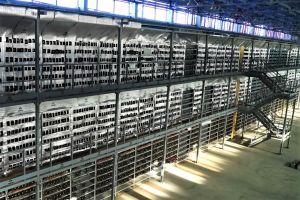This is How Institutional Players Help Bitcoin Mining Industry Grow
Institutional players are entering the cryptoasset mining industry, prompting the creation of enterprise-grade solutions, but also offering new solutions for existing challenges, according to Igor Runets, founder and CEO of BitRiver, a Russia-based mining services provider that is now open to approaches from strategic investors.

Runets and his business partner had started a fund for Bitcoin (BTC) mining back in 2016, but geopolitical issues of the time, which prevented the purchased mining machines from being located in Russia, forced him to face a dilemma: declare bankruptcy on the data center dedicated to those devices, or buy it and convert it into a colocation business. He told Cryptonews.com that he chose the latter, thus forming BitRiver. “Soon after the data center started generating profit, I raised money from international investors,” said Runets, claiming that they are today “the largest datacenter that offers Bitcoin mining colocation services in Russia and Central Asia, and are operating profitably.”
The CEO, however, has noticed some trends becoming more prominent lately, saying that,
“One of the main trends in the mining industry is the entrance of institutional players and, as a result, the introduction of new enterprise-grade services for the mining industry.”
As examples, Runets gave companies such as Digital Currency Group starting a subsidiary, Foundry, to offer financial services to miners, as well as financial services company Charles Schwab purchasing shares of cryptoasset mining companies, thus joining major companies like Fidelity and Vanguard.
A main challenge in the industry today, said the CEO, is timely delivery of ordered mining hardware. Customers of major mining hardware maker Bitmain, for example, have been experiencing delays because of internal management issues at the company, he said.
However, here too institutions might bring a solution.
“As mining becomes more institutionalized, institutional players are also offering new solutions to existing challenges in the mining industry,” Runets said, giving an example of a recently announced partnership between Foundry and MicroBT, a China-based major crypto mining hardware manufacturer, as the latter aims to increase its market share in North America and improve supply chain efficiencies for North American buyers of its mining machines.
More capital and products for novices
In line with this, in the near future, BitRiver plans to increase their product offerings for institutional investors globally, specifically those who are not familiar with cryptocurrency mining. “These products provide such investors the experience of traditional investment products without the need to get into the nitty-gritty of bitcoin mining economics,” said the founder.
Meanwhile, their Bratsk data center is currently in operation, but there are other sites too, which are “in varying states of development.” BitRiver is utilizing over 70MW of power to mine cryptocurrencies at Bratsk, while they are “in the process of scaling this up to the maximum capacity of the site i.e. 100MW.”
That said, the company is open to strategic investors.
“We are in a stage of rapid growth and are simultaneously working on several highly lucrative sites in different stages of development both in Russia and abroad; all these plans require capital. Consequently, we are open for strategic investors that would allow us to grow even faster.”
Meanwhile, the demand for BitRiver services has been lower than last year, which the CEO said is due to the coronavirus pandemic, as well as the uncertainty around Bitcoin halving. But businesses are recovering after the onset of the pandemic, and the demand is increasing again, he said, adding that the company signed “some major contracts with new clients in the recent months.”
Speaking of the pandemic, the travel restrictions also affected the company as new clients have been unable to visit the data center before hosting large quantities of machines with BitRiver, as was a common practice before.
A law to ban token rewards for miners is ‘likely’
Recent reports claimed that the Russian Ministry of Finance wanted to ban crypto miners from receiving token rewards, which might result in a ban on the circulation of cryptoassets in Russia. Runets commented that,
“We believe that such a law will likely come into effect but we do not see any risks for our business and our ability to host foreign clients. This law was designed specifically in a way that allows the hosting business.”
Almost all of the company’s operation is dedicated to colocation, with the CEO being a customer as well, he said, adding that he doesn’t own “a large amount of miners – less than 1MW.”
The largest percentage of BitRiver’s operation that any client owns is about 20%, while the smallest is roughly 0.1%. “We work mostly with large scale miners,” Runets said.
Most of the clients are based abroad, in over 20 countries currently, and mostly in Japan, USA, and the EU.
___
Learn more:
Bitcoin Miners Are Using New Strategies to Hedge Risks
Bitcoin Fees Skyrocket, Some Transactions Taking Days, Relief Possible Next Week
Bitfarms Signs a Deal That Cuts Bitcoin Mining Power Costs in Half
Former Gulag in Russian Arctic Bids to Become Bitcoin Mining Hotspot




